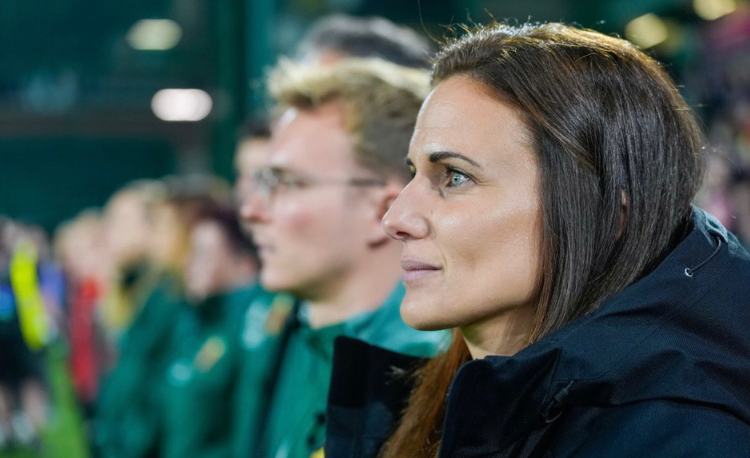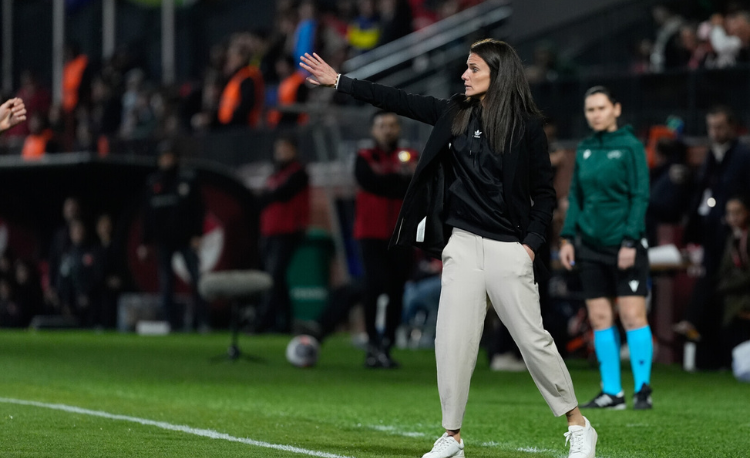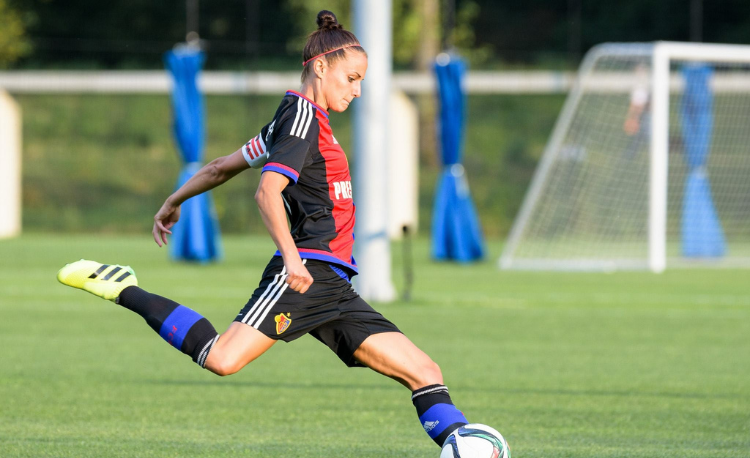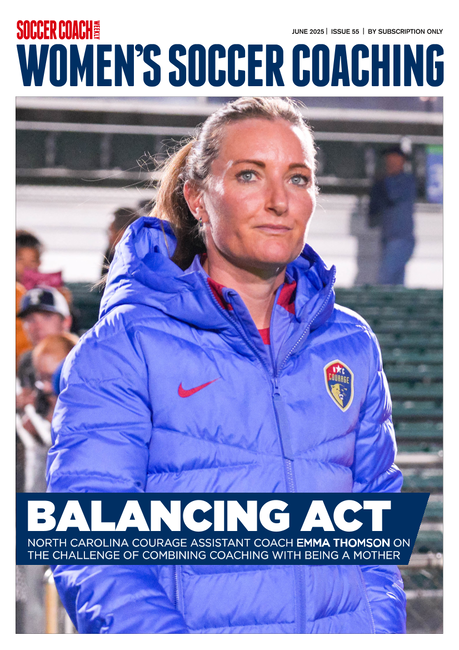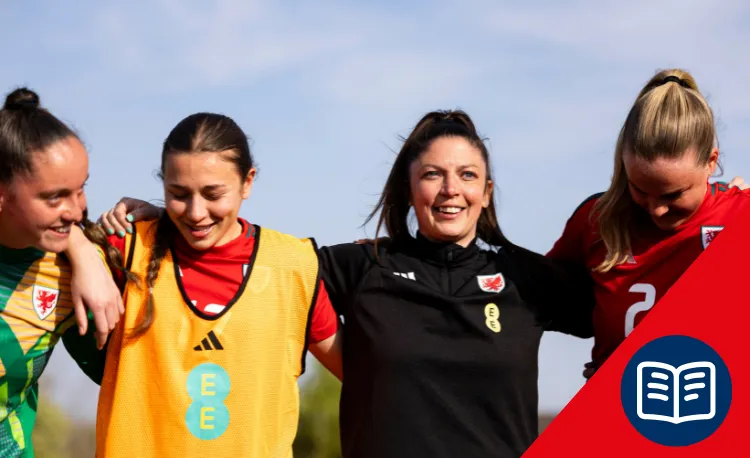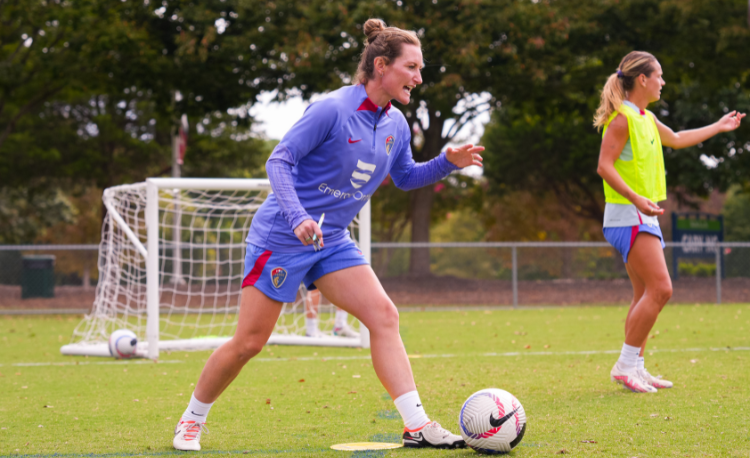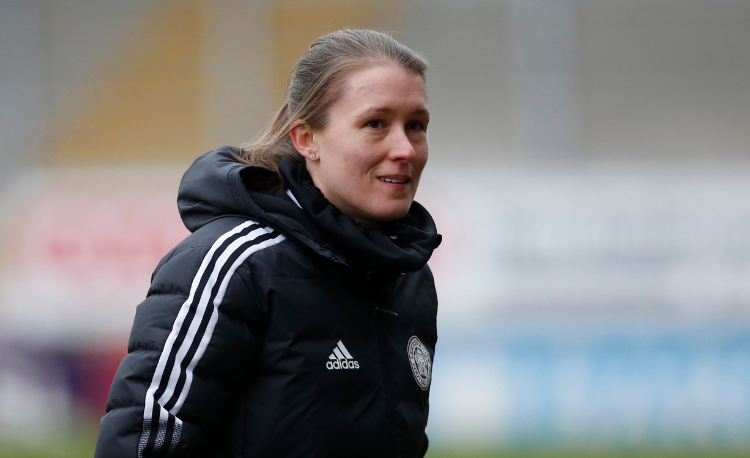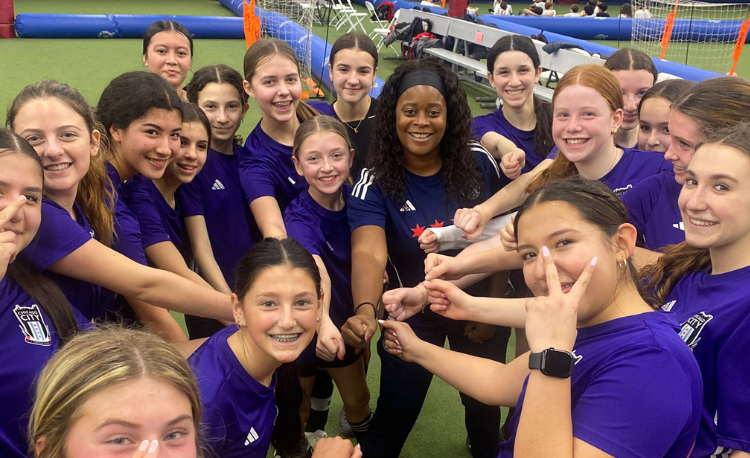You are viewing
1 of your 3 free articles
Alexandra Szarvas: 'Jump on this train'
That’s the call from ambitious Hungary head coach Alexandra Szarvas to clubs as she aims to improve her country’s fortunes. Carrie Dunn finds out how she got the national team job – and what she wants to do with it...
When Alexandra Szarvas was promoted to Hungary’s head coach in March 2024, from her role in charge of the U19s, she had just over two weeks to prepare for a European Championships qualifier.
Not only that, but it hadn’t been publicly announced, not even to her U19s staff, until a few days before the match.
So, she took the opportunity to get some advice from one of the best coaches in the world, Sarina Wiegman, in a Uefa mentoring question-and-answer session.
Alexandra told WSC: “My first question was, ‘What would be your advice to me, because I just signed as [the Hungary] coach, and I have just 15 days to prepare?’
“She was like, ‘Fifteen days?! Good luck!’ This was her answer!
“After that, she told me to keep it simple. Don’t dig too deep, have your standards [and] the boundaries from the beginning.
“She was just empowering me; it will be something different, the pressure you have to deal with, but just enjoy the first time, because it will never come back.”
Alex knew from an early age that she would be a coach. After first kicking a ball at the age of six, her curiosity about the game developed as she progressed as a player.
“When you start, you’re just enjoying the game, and you don’t think about anything else,” she said. “You have just the ball on the feet and you would just want to play.
“This is the most beautiful, thing about football, I think. Sometimes I miss that, from the players nowadays.
“When I was 14, 15, that was the time when I started to ask questions of the coaches: ‘Why do we do that and this?’. It was quite strange for them as well, because it’s not common that a kid’s asking questions.
“But I was always curious because I wanted to understand the game.”
As a teenager, Alex played for Viktória FC, in Szombathely, who reached the Uefa Women’s Champions League and were drawn against Bayern Munich.
It was thrilling and scary for all involved, not least 17-year-old Alex, who was offered a trial and, subsequently, a professional contract at Bayern a few days after the game.
She later moved on to VfB Sindelfingen, and then crossed the border to Switzerland, where she played for SC Kriens and Basel.
She retired from playing at the relatively young age of 25, feeling like she had lost her passion for the game.
Alex said: “Mentally, it was very tough, and after I stopped my career, it was like I fell in a little depression.
“But I started to coach two months later with little boys. They were just 13.
“I always say they saved my passion for football at this time, because they gave me back this love for it with every single training [session] when I was there with them.
“This was the most beautiful thing at this time for me to coach these little boys, because they were just enjoying the game – how I felt playing on the outside when I was a little child.
“Sometimes, life gives you something and takes away from you something, but, now, I can say I’m fine with that.”
Her struggles towards the end of her playing career have shaped the way that she thinks about her own coaching practices.
“I was a very passionate player, I always wanted to compete, and if I lost a five-a-side game at the end of training, I went home and you couldn’t talk to me for two hours. I went home angry and not with a smile.
“So I promised myself this: ‘If you will be a coach, then your players have to finish training with a smile.’
“That’s why I always make some kind of challenge, like hit the crossbar or something; a small game. You can lose that as well, but it’s just funny.
“Even if you don’t hit the crossbar, you just smile because maybe the player before you kicked the ball three metres above!”
Of course, Alex is committed to football as a sport, but, as a coach, she describes herself as “obsessed with people”.
“I don’t coach players. I coach people,” she said. “I like to talk to them, and I want to know the big picture behind their football career.
“It’s not just about football. I keep talking to them, asking questions [about] how they feel – and not just about football, [but] about their lives, because then you know much more, and you can treat them better.”
Whether she is coaching teenage boys or the Hungarian national team, her principles stay the same.
“The one thing I can do really good is just treating people good,” she said.
“It doesn’t matter if they are just 13 years old, or 17-year-old boys, 19-year-old girls or 25-year-old women. It’s just about people.”
Of course, training sessions have to be different, according to age and ability, so Alex advises coaches to think about what their players want.
The boys’ team she first coached, for example, were “just there to improve and enjoy the game”, she said – but, when she took over the FC Thun U16 boys in her first full-time coaching role, in January 2022, that required a different approach.
“I was the first ever female in Switzerland who could lead an elite boys’ youth team,” Alex said.
“This was a little bit more challenging at the beginning with one or two players, because they’re really strong personalities, but with many talks, again to get to know them better, you can treat them better.
“Get to know the people and then you can use the keys to them.
“If you want to be a good coach, you cannot treat everybody the same, because they all need something different from you.”
Alongside her club responsibilities, she spent three years working in the Swiss national set-up, then returned to Hungary in the summer of 2023 to lead the U19 women.
Less than a year later, she was appointed head coach of the senior side.
For a habitual planner, this had not been on the agenda.
Alex loved her life in Switzerland, where she had completed all her coaching qualifications, up to the Uefa A Licence.
When she was offered the role of Hungary U19s coach, for which she would have to move back home, she also had the chance to manage two leading Swiss teams.
She agreed to accept the role with the U19s if the Hungarian federation could support her through taking her Uefa Pro Licence.
They confirmed that they would, so Alex decided to make the move full-time into the national system after 23 years playing and coaching in club football.
“I just wanted something different, to step away a little bit from daily trainings, and game of a weekend,” she said.
“If you are with the national team, you have these 10-day camps, 60 days in a year, and then you have to perform. It’s like pressure in that ten days, but it’s really a different job.”
Before she even signed the contract, though, the executives mentioned that they saw her as the head coach of the senior side sooner or later – and she found herself in the hot-seat in March 2024, when Margret Kratz left the role.
“I knew half of the team, because they were my team-mates when I was in the national team,” Alex explained. “The rest are young players and want to improve.
“The pressure, and to deal with the board...I didn’t know if I would be ready for that position. But you know you are ready if you are there.
“I started last March, and I’m still here!”
That transition into coaching former team-mates and contemporaries could have presented a challenge – but Alex did her prep, speaking to the senior players and ensuring the squad and staff were all aligned in their principles, style of play and expectations.
“I was 31 when I took over, [but] they didn’t give me the feeling, ‘What are you doing here? You are just a young coach, what do you want from me?’ Never.
“Now I can say that we are on a very good way, we improved a lot as a team, and [we] just keep pushing and keep improving.
“But [there’s] a long way ahead of us, I would say.”
Alex sees her job not just as coaching the national team, but forging change in women’s football across the country.
“It’s a responsibility for me,” she said, “The A team is the A team – this is the mirror [to the world] of Hungarian women’s football, and because, to be honest, as a national team coach, you just borrow the players from the clubs.
“You spend 60 days a year together. But what do they [the players] do, the other two-hundred-and-whatever days, in the clubs?
“So it’s a big responsibility to help the clubs. You have to jump on this train because, if you do, we can improve together.
“If you’re just stuck, and you think what you are doing is enough, then it will not change anything.
“But we have to have changes. We have to jump on this train to improve the players together.”
She has seen similar countries progress, and picks out Poland – who have earned promotion to the top tier of the Uefa Women’s Nations League and qualified for Euro 2025 – as a great example to follow.
“They are investing much more and they are improving much more,” she said.
“I really hope – and I will do everything – that we all jump on this train, because if you don’t, it will just pass by, and then you’re out.
“I’m quite sure that I cannot do this alone. You need the clubs, you need a good co-operation, and you need one goal together,
“Everybody has to row in this boat together – because, if not, then you have no chance.”
Related Files
Having lunch with Robben and Muller: Alex’s playing career
Alex was a target-setter from an early age, and that included some out-of-the-ordinary choices in her playing career, opting to move to different countries.
“It was always a dream, because, in Hungary, the women’s football was not that high level, so every child had this dream,” she said.
“To be honest, I would say today [it] is more difficult to go outside of your country, because the standards are higher. But at the time, it was not that common that a young player [would] go abroad and leave everything behind.”
When she was 17, Alex left Viktória FC Szombathely to sign professional terms at Bayern, and noticed the contrast in standards and intensity right away. The infrastructure was also remarkably different.
“I was having lunch with [Arjen] Robben and Thomas Muller and these kind of players. I was just 17, sitting there, and I couldn’t believe that it’s happening!”
After Bayern, she stayed in Germany with VfL Sindelfingen, before moving to Switzerland becoming a prolific striker for SC Kriens and FC Basel Frauen.
‘i’m so thankful for these people’: alex reflects on the two valuable mentors who helped her in her coaching career
Alex picks out two coaches, in particular, as special inspirations to her.
Her first mentor was Kaan Kahraman, who coached her for some years at FC Basel, appointed her as his vice-captain, and later invited her to be his assistant coach with the Switzerland U16s.
“He always told me, ‘I hope you will be a coach,’” she says.
The second came more formally, via Uefa’s mentoring programme – Nils Nielsen, now the coach of Japan’s women, and previously the coach of Switzerland.
Alex applied for the scheme and asked whether she could be paired with Nielsen, who she had got to know a little bit in the Swiss set-up.
“It’s Uefa who decides,” she explains. “They decide if you fit together: if he or she can help you.
“I asked for Nils and I got him. Now I would say it’s a real friendship also.
“I’m so thankful for these two people.”
Newsletter Sign Up
Newsletter Sign Up
Discover the simple way to become a more effective, more successful soccer coach
In a recent survey 89% of subscribers said Women's Soccer Coaching makes them more confident, 91% said Women's Soccer Coaching makes them a more effective coach and 93% said Women's Soccer Coaching makes them more inspired.
*includes 3 coaching manuals
Get Inspired
All the latest techniques and approaches
Women's Soccer Coaching offers proven and easy to use soccer drills, coaching sessions, practice plans, small-sided games, warm-ups, training tips and advice.
We've been at the cutting edge of soccer coaching since we launched Soccer Coach Weekly in 2007, creating resources for the grassroots youth coach, following best practice from around the world and insights from the professional game.
